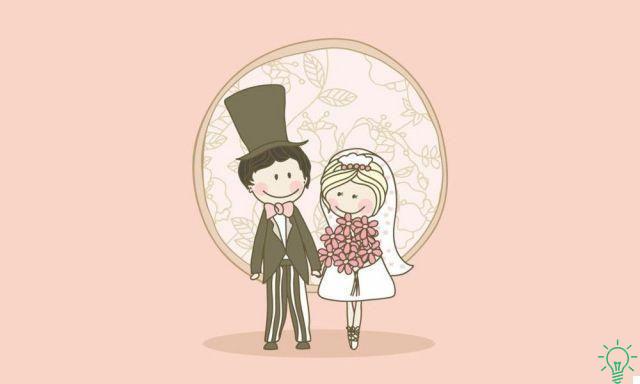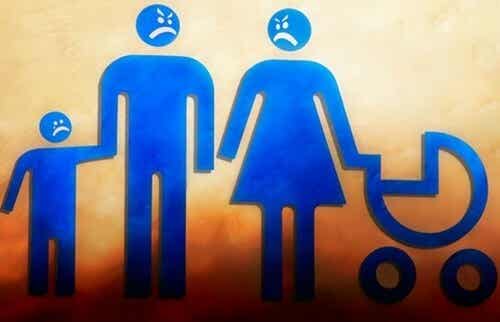The decision-making process in the couple is based more on our mental anticipations than on the reality we live with the partner.

Last update: May 22, 2022
All couples face situations in which they have to make decisions. And however important or not they are, they all require negotiation. It is perfectly normal to disagree with your partner about everything or to have divergent opinions on how to make a choice. The decision-making process in the couple, in fact, does not consist only in taking a position for or against something; making a decision together is a test of the strength and harmony of the relationship itself.
In this article we will try to identify the variables that influence the decision-making process in the couple and the problems that can arise when you have to choose a direction, take a risk, make a big change or miss an opportunity. In this sense, we will focus on the most important and common decisions that are often a source of conflict:
- When you are experiencing a couple crisis or have been together for a long time (and the feelings are no longer the same as before), it could arise the question of whether to continue being together or to separate.
- Take the important step of living together.
- Spend the holidays with the respective families of origin (for example: the weekend at the home of the in-laws, Christmas, Easter, etc.).
- To get married.
- Having children.
- The type of education to be given to the children.
- Change job, having a long-distance relationship or moving to another place.
- Evaluate other ways of relating in the couple (for example, an open relationship or polyamory).
- Time to dedicate to yourself, individually.
The decision-making process in the couple
Self-confidence
The opinion that one has of oneself and the perception that one's opinion has value and weight has a great influence on the decision-making process in the couple. Confident people have all the resources to stand up for their beliefs and influence the final decision. In other words, a person who believes in himself plays an active role in the couple's choices, while those who are insecure risk remaining in the shadow of their partner's decisions.
Likewise, self-confidence makes it less likely to be silent out of fear of rejection. Overcoming fear in sensitive issues that affect the couple is essential to assert your voice and take a stand. Insecure people sacrifice their ability to influence to make a good impression; they tend to say what others want to hear or what it takes to avoid conflict.
The place that the other occupies in the shared life project
When it comes to making a decision as a couple, a key aspect is the place that the other occupies in our idea of the future or life plan. The decision-making process is therefore based more on the future than on the present, but what does it really mean?
That the potential we see in the partner plays an extremely important role in their involvement in life projects such as having children, marrying or living together. The decision-making process in the couple is based more on mental anticipations than on the reality that one experiences with the partner.
In this sense, in his Triangular Theory of Love, Sternberg argued for the importance of three fundamental components so that love can be considered full and mature, one of these is commitment. But he was not referring to the commitment in the legal sense, fidelity or relationship, but rather the commitment for the future of the relationship itself.
For decision making to be successful, commitment is required: that is, working as a group to achieve common goals.
"The decision-making process in the couple is based more on our mental anticipations than on the reality we live with the partner."
Your communication skills and the ability to understand your partner
Good communication skills are indispensable in sharing fears, doubts, hopes and desires. Think that verbalizing everything that comes to mind and that contributes in some way to the pre-decision reflective process will have constructive potential: it will be an added value.
It is not necessary to say everything you think, but think and hear everything you say. Otherwise, you will leave room for ambivalent and unclear communication, in which there will be too much room for interpretation, which is undoubtedly a dangerous element for the life of a couple.
The recipient of your messages must also be able to understand what you want to convey with your words. It means that the other must understand what you say, understand why what you say is important to you. In this sense, non-verbal communication plays an equally important role.
It is impossible not to communicate, and in the context of a decision-making process it is essential that what has been said is consistent with the rest of the elements expressed. Any inconsistency can generate a misunderstanding that causes discomfort, such as being happy with the preparations for a wedding and continuing to think that getting married will lead the relationship to failure.
"It is impossible not to communicate, and in the decision-making process it is essential that what we say is consistent with what we demonstrate."
The decision-making process in the couple: to conclude
The decision-making process in the couple must be shared by both partners. The extent to which it occurs will in fact be an indicator of a long-lasting and satisfying relationship, according to research conducted by Kamp Dush and Taylor (2011) of Ohio University (United States).
On the other hand, it is the same It is necessary to strive to limit external influences that can interfere in the couple's decision-making process. We must give priority to what we and our partner feel, leaving the desire to please others in the background.


























